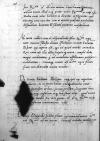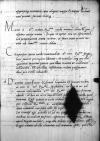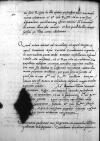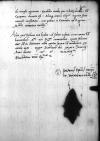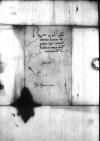List #1104
Piotr TOMICKI do Ioannes DANTISCUSPiotrków, 1534-01-25
| odebrano [1534]-01-31 Rękopiśmienne podstawy źródłowe:
Pomocnicze podstawy źródłowe:
Publikacje:
| ||||||||||||||||||||||
Tekst + aparat krytyczny + komentarz Zwykły tekst Tekst + komentarz Tekst + aparat krytyczny
Reverendissimo in Christo Patri, domino
Reverendissime in Christo Pater et Domine, frater et amice carissime et honorande.
Accepi cf.
Quod vero de domino
ms 1 pro[...]ns paper damaged⌈proficiscensms 2 proficiscens,
ms 1 pro[...]ns paper damaged⌉ id negotii ad maiestatem suam deferre in mandatis ms 2 habeat,
ms 1 [...] paper damaged⌈habeatms 2 habeat,
ms 1 [...] paper damaged⌉, qui et suam, et Dominationis Vestrae iniuriam apud suam maiestatems 2 m,
ms 1 [...] paper damaged⌈mms 2 m,
ms 1 [...] paper damaged⌉ ms 2 regiam,
ms 1 [...] paper damaged⌈regiamms 2 regiam,
ms 1 [...] paper damaged⌉[1] cordate procul dubio exponet. Cui ego, quantms 2 um potui, litteris,
ms 1 [...] paper damaged⌈um potui, litterisms 2 um potui, litteris,
ms 1 [...] paper damaged⌉ ad
ms 1 [...] paper damaged⌈nime summs 2 nime sum,
ms 1 [...] paper damaged⌉ gravatus.
Verum res haec reverendissimum dominum
ms 1 [...] paper damaged⌈Gneznensemms 2 Gneznensem,
ms 1 [...] paper damaged⌉
ms 1 n[...] paper damaged⌈novoms 2 novo,
ms 1 n[...] paper damaged⌉ iuramento istic inter consiliarios praestari instituto in aurem et confidenter sibi scripserat, invulgarit. Quod tametsi se audisse  BCz, 247, p. 178 sua Reverendissima Dominatio ab uno minime vano homine fateatur, noluit tamen illud cuiquam praeter Vestram Reverendissimam Dominationem notum esse. Multa enim inter homines et dicuntur, et finguntur, quae utcumque vera non sint, cum in aperto prolata non fuerint, dissimulare homines et silentio praeterire consueverunt.
BCz, 247, p. 178 sua Reverendissima Dominatio ab uno minime vano homine fateatur, noluit tamen illud cuiquam praeter Vestram Reverendissimam Dominationem notum esse. Multa enim inter homines et dicuntur, et finguntur, quae utcumque vera non sint, cum in aperto prolata non fuerint, dissimulare homines et silentio praeterire consueverunt.
Ab initio adhuc, cum de despondenda
De
ms 1 [...]aderem paper damaged⌈suaderemms 2 suaderem,
ms 1 [...]aderem paper damaged⌉, si, ut fama habet, valetudinarius esset. ms 2 Nam,
ms 1 [...]m paper damaged⌈Namms 2 Nam,
ms 1 [...]m paper damaged⌉ formosam et bene sanam
ms 1 [...]to paper damaged⌈maritoms 2 marito,
ms 1 [...]to paper damaged⌉ neque consultum, neque honestum esset. Quod tamen ms 2 sit illius,
ms 1 [...]us paper damaged⌈sit illiusms 2 sit illius,
ms 1 [...]us paper damaged⌉ morbi seu vitii genus, Dominatio Vestra Reverendissima mihi ms 2 per occasionem,
ms 1 [...]ccasionem paper damaged⌈per occasionemms 2 per occasionem,
ms 1 [...]ccasionem paper damaged⌉ communicare velit.
Domini  BCz, 247, p. 179 usquequaque necessariae, qua aliquot magni principes contenti esse possent, foveam alamque.
BCz, 247, p. 179 usquequaque necessariae, qua aliquot magni principes contenti esse possent, foveam alamque.
Munus a Dominatione Vestra Reverendissima mihi missum alacri et gratissimo accepi animo. In quo, ut optat, non rei aestimationem, sed propensionem animi metior et facio tanti, quanti merito ab carissimo amico debeo.
Dominus
ms 1 pr[...] paper damaged⌈praestoms 2 praesto,
ms 1 pr[...] paper damaged⌉ esse futurum obtuli et hoc ea in re impedimenti ms 2 subesse declaravi,
ms 1 sub [...] laravi paper damaged⌈subesse declaravims 2 subesse declaravi,
ms 1 sub [...] laravi paper damaged⌉, quod dominus
ms 1 s[...] paper damaged⌈se apudms 2 se apud,
ms 1 s[...] paper damaged⌉
ms 1 [...]fidelitatis paper damaged⌈et crimine infidelitatisms 2 et crimine infidelitatis,
ms 1 [...]fidelitatis paper damaged⌉ notatum, non satis recte sit erga ms 2 illam animatus,
ms 1 i [...] us paper damaged⌈illam animatusms 2 illam animatus,
ms 1 i [...] us paper damaged⌉. Cui tametsi ego, quando id ad me ms 2 perscripserat,
ms 1 pers[...] paper damaged⌈perscripseratms 2 perscripserat,
ms 1 pers[...] paper damaged⌉, multis rationibus, ne crederet, persuasi, affirmans ms 2 me id numquam,
ms 1 m [...] umquam paper damaged⌈me id numquamms 2 me id numquam,
ms 1 m [...] umquam paper damaged⌉ dictum apud
ms 1 [...]gnovisse paper damaged⌈agnovissems 2 agnovisse,
ms 1 [...]gnovisse paper damaged⌉, quod regis animus ab illo alienatus vel minimum esset, quin etiam  BCz, 247, p. 180 me scire regem de illo optime persuasum esse, non inutile tamen arbitrarer, si Dominatio Vestra Reverendissima id se a me scire dissimulans, qualibuscumque officiis amicitiae et benevolentiae devincere illum sibi curaret, ut hoc, quod de illa concepit, sensim ex illius animo aboleretur.
BCz, 247, p. 180 me scire regem de illo optime persuasum esse, non inutile tamen arbitrarer, si Dominatio Vestra Reverendissima id se a me scire dissimulans, qualibuscumque officiis amicitiae et benevolentiae devincere illum sibi curaret, ut hoc, quod de illa concepit, sensim ex illius animo aboleretur.
Quod autem attinet ad curandum et apud
ms 1 [...] paper damaged⌈etms 2 et,
ms 1 [...] paper damaged⌉ dominum
ms 1 [...]as paper damaged⌈measms 2 meas,
ms 1 [...]as paper damaged⌉ et contendam, ut eos in sententiam Dominationis Vestrae Reverendissimae ms 2 pertrahere,
ms 1 [...]here paper damaged⌈pertraherems 2 pertrahere,
ms 1 [...]here paper damaged⌉ possim. Quod equidem non diffido mihi ms 2 feliciter,
ms 1 [...]r paper damaged⌈feliciterms 2 feliciter,
ms 1 [...]r paper damaged⌉ successurum. Interim Dominatio Vestra Reverendissima sibi ipsa ms 2 non desit,
ms 1 [...]sit paper damaged⌈non desitms 2 non desit,
ms 1 [...]sit paper damaged⌉, et quae in rem suam expedire deinceps cognoscet, ms 2 me de,
ms 1 [...]e paper damaged⌈me dems 2 me de,
ms 1 [...]e paper damaged⌉ his facere certiorem non gravetur.
 BCz, 247, p. 181 de mansis agrorum, exactio civilis quae schoss dicitur et czopowe decreta est. Aliaque omnia reipublicae negotia sunt commode constituta, cum quibus a conventu ad
BCz, 247, p. 181 de mansis agrorum, exactio civilis quae schoss dicitur et czopowe decreta est. Aliaque omnia reipublicae negotia sunt commode constituta, cum quibus a conventu ad
Alia, quae scribam, non habeo, id solum restat, ut me amori et benevolentiae Dominationis Vestrae Reverendissimae commendem, quam felicem esse et in diuturna vita optime sanam et incolumem ex animo opto.
Eiusdem Vestrae Reverendissimae Dominationis

